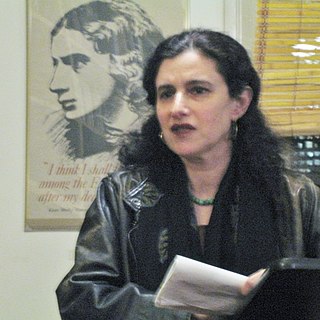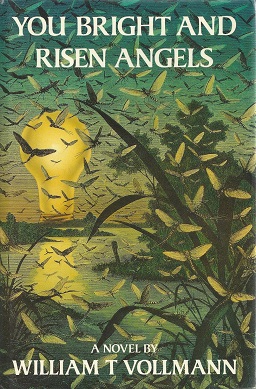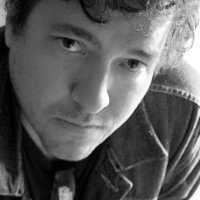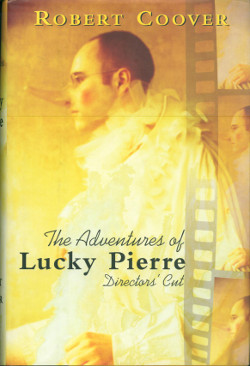
Cyberpunk is a subgenre of science fiction in a dystopian futuristic setting that tends to focus on a "combination of lowlife and high tech", featuring futuristic technological and scientific achievements, such as artificial intelligence and cyberware, juxtaposed with societal collapse, dystopia or decay. Much of cyberpunk is rooted in the New Wave science fiction movement of the 1960s and 1970s, when writers like Philip K. Dick, Michael Moorcock, Roger Zelazny, John Brunner, J. G. Ballard, Philip José Farmer and Harlan Ellison examined the impact of drug culture, technology, and the sexual revolution while avoiding the utopian tendencies of earlier science fiction.
Metafiction is a form of fiction that emphasizes its own narrative structure in a way that inherently reminds the audience that they are reading or viewing a fictional work. Metafiction is self-conscious about language, literary form, and story-telling, and works of metafiction directly or indirectly draw attention to their status as artifacts. Metafiction is frequently used as a form of parody or a tool to undermine literary conventions and explore the relationship between literature and reality, life, and art.

John Simmons Barth is an American writer who is best known for his postmodern and metafictional fiction. His most highly regarded and influential works were published in the 1960s, and include The Sot-Weed Factor, a whimsical retelling of Maryland's colonial history, Giles Goat-Boy, a satirical fantasy in which a university is a microcosm of the Cold War world, and Lost in the Funhouse, a self-referential and experimental collection of short stories. He was co-recipient of the National Book Award in 1973 for his episodic novel Chimera.

Gerald Robert Vizenor is an American writer and scholar, and an enrolled member of the Minnesota Chippewa Tribe, White Earth Reservation. Vizenor also taught for many years at the University of California, Berkeley, where he was Director of Native American Studies. With more than 30 books published, Vizenor is Professor Emeritus at the University of California, Berkeley, and Professor of American Studies at the University of New Mexico.

William Tanner Vollmann is an American novelist, journalist, war correspondent, short story writer, and essayist. He won the 2005 National Book Award for Fiction with the novel Europe Central.

Robert Lowell Coover is an American novelist, short story writer, and T.B. Stowell Professor Emeritus in Literary Arts at Brown University. He is generally considered a writer of fabulation and metafiction.

Postmodern literature is a form of literature that is characterized by the use of metafiction, unreliable narration, self-reflexivity, intertextuality, and which often thematizes both historical and political issues. This style of experimental literature emerged strongly in the United States in the 1960s through the writings of authors such as Kurt Vonnegut, Thomas Pynchon, William Gaddis, Philip K. Dick, Kathy Acker, and John Barth. Postmodernists often challenge authorities, which has been seen as a symptom of the fact that this style of literature first emerged in the context of political tendencies in the 1960s. This inspiration is, among other things, seen through how postmodern literature is highly self-reflexive about the political issues it speaks to.

Donald Barthelme Jr. was an American short story writer and novelist known for his playful, postmodernist style of short fiction. Barthelme also worked as a newspaper reporter for the Houston Post, was managing editor of Location magazine, director of the Contemporary Arts Museum in Houston (1961–1962), co-founder of Fiction, and a professor at various universities. He also was one of the original founders of the University of Houston Creative Writing Program.
Joseph Prince McElroy is an American novelist, short story writer, and essayist. He is noted for his long postmodern novels such as Women and Men.
San Diego State University Press is a university press that is part of San Diego State University, with noted specializations in Border Studies, Critical Theory, Latin American Studies, Cultural Studies, and comics. It is the oldest university press in the California State University system. It presently publishes books under two rubrics: CODEX, focused on critical theory, and surTEXT, focused on Latin American/Transamerican Cultural Studies. In 2006, SDSU Press also inaugurated Hyperbole Books, specializing in "publishing cutting-edge, over-the-top experiments in critical theory, literary criticism and graphic narrative."

Susan Daitch is an American novelist and short story writer. In 1996 David Foster Wallace called her "one of the most intelligent and attentive writers at work in the U.S. today."

You Bright and Risen Angels is a 1987 novel by William T. Vollmann, detailing a fictional war between insects and the forces of modern civilization. Vollmann described the book, his first, as "an allegory in part", inspired by his experiences with the mujahedeen in Afghanistan. The novel is subtitled "A Cartoon." It is illustrated by the author.

Michael Hemmingson was a novelist, short story writer, literary critic, cultural anthropologist, qualitative researcher, playwright, music critic and screenwriter. He died in Tijuana, Mexico on 9 January 2014. The reported cause was cardiac arrest.

Storming the Reality Studio: A Casebook of Cyberpunk and Postmodern Science Fiction, edited by Larry McCaffery, was published by Duke University Press in 1992, though most of its contents had been featured in Mississippi Review in 1988.

Avant-Pop: Fiction for a Daydream Nation is a Fiction Collective Two book published by Black Ice Books in 1992 edited by Larry McCaffery. It is a collection of innovative fiction, graphic art, and various unclassifiable texts written by some of the most radical literary talents who McCaffery classifies as Avantpop. In his introductory chapter, McCaffery calls these writers "a new breed of pop-culture demolition artists". These writers include cult figures such as Kathy Acker, Samuel R. Delany, Harold Jaffe and Derek Pell, as well as young new writers such as Euridice, Mark Leyner, and William T. Vollmann.
The 20th Century's Greatest Hits: 100 English-Language Books of Fiction is a list of the 100 best English-language books of the 20th century compiled by American literary critic Larry McCaffery. The list was created largely in response to the Modern Library 100 Best Novels list (1999), which McCaffery considered out of touch with 20th-century fiction. McCaffery wrote that he saw his list "as a means of sharing with readers my own views about what books are going to be read 100 or 1000 years from now".
The Review of Contemporary Fiction is a tri-quarterly journal published by Dalkey Archive Press. It features a variety of fiction, reviews and critical essays on literature that has an experimental, avant-garde or subversive bent. Founded in 1980 by the publisher John O'Brien, The Review of Contemporary Fiction originally focused upon American and British writers who had been overlooked by the critical establishment, and in this manner the Review succeeded in bringing new critical attention to writers such as William Gaddis, Gilbert Sorrentino, Paul Metcalf, Nicholas Mosley, Donald Barthelme, and many others. In 1984, in order to begin reprinting some of these authors, John O'Brien founded Dalkey Archive Press.

The Rainbow Stories is a collection of short stories about American culture written by William T. Vollmann and published in 1989. Written in the style of narrative journalism, it was his second published fictional work, preceded by You Bright and Risen Angels. The book consists of thirteen interlocking stories that range in scope from ancient Babylon to modern San Francisco. Steven Moore wrote of the book that "Vollmann's verbal prowess, empathy, and astonishing range put him in a class apart from his contemporaries." Robert Rebein described the book as a "real breakthrough" for Vollman, stating: "[Rainbow Stories is] a book that mixed reportorial and fictional techniques to powerfully evoke the lives of prostitutes and skinheads on the streets of San Francisco's Tenderloin district."

The Adventures of Lucky Pierre: Director's Cut is a novel by Robert Coover, published in 2002. The title is the same as a 1961 nudie cutie film, and like the film, the novel is divided into multiple vignettes, starring the title character Pierre.
Avant-pop is popular music that is experimental, new, and distinct from previous styles while retaining an immediate accessibility for the listener. The term implies a combination of avant-garde sensibilities with existing elements from popular music in the service of novel or idiosyncratic artistic visions.














